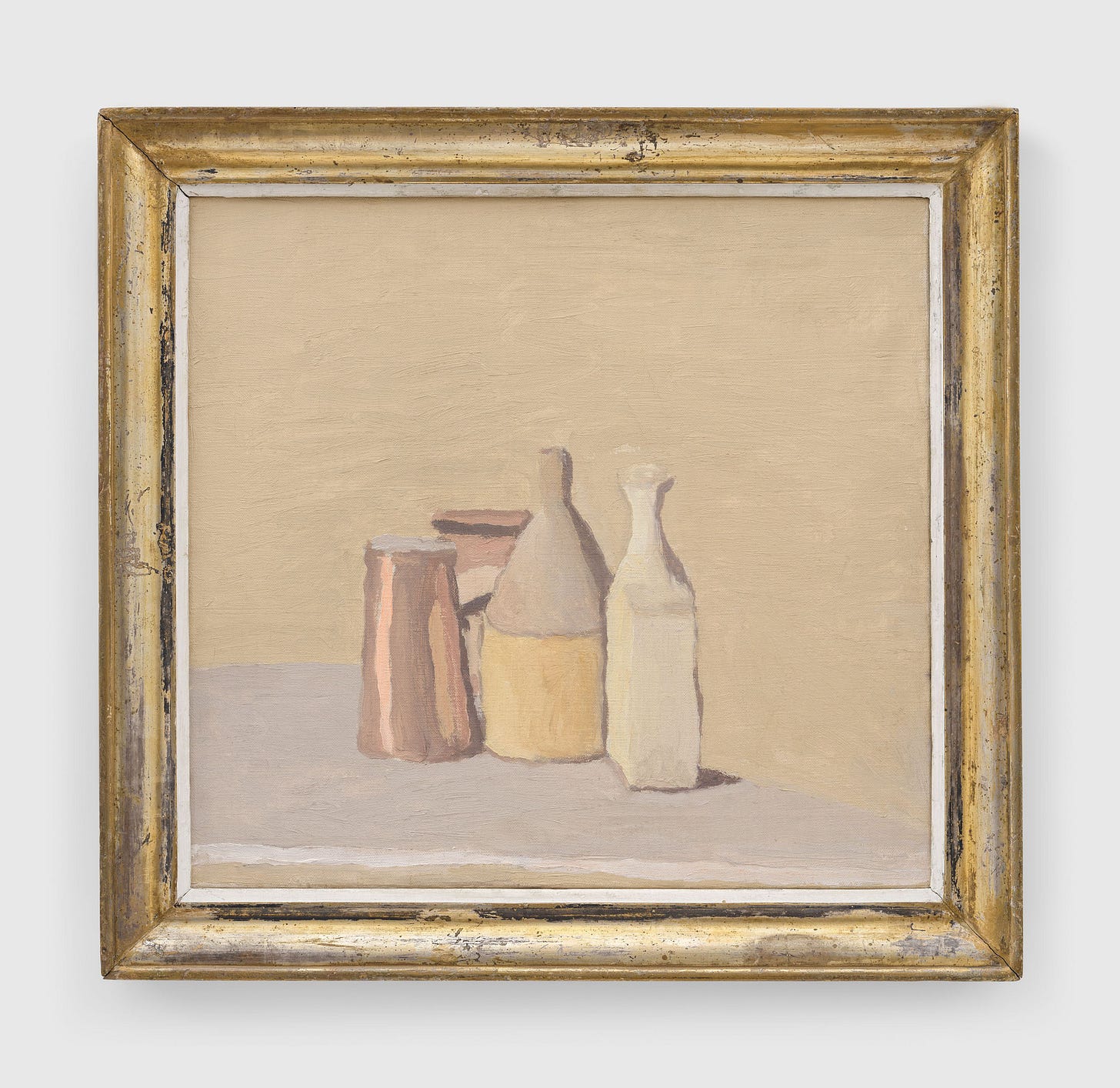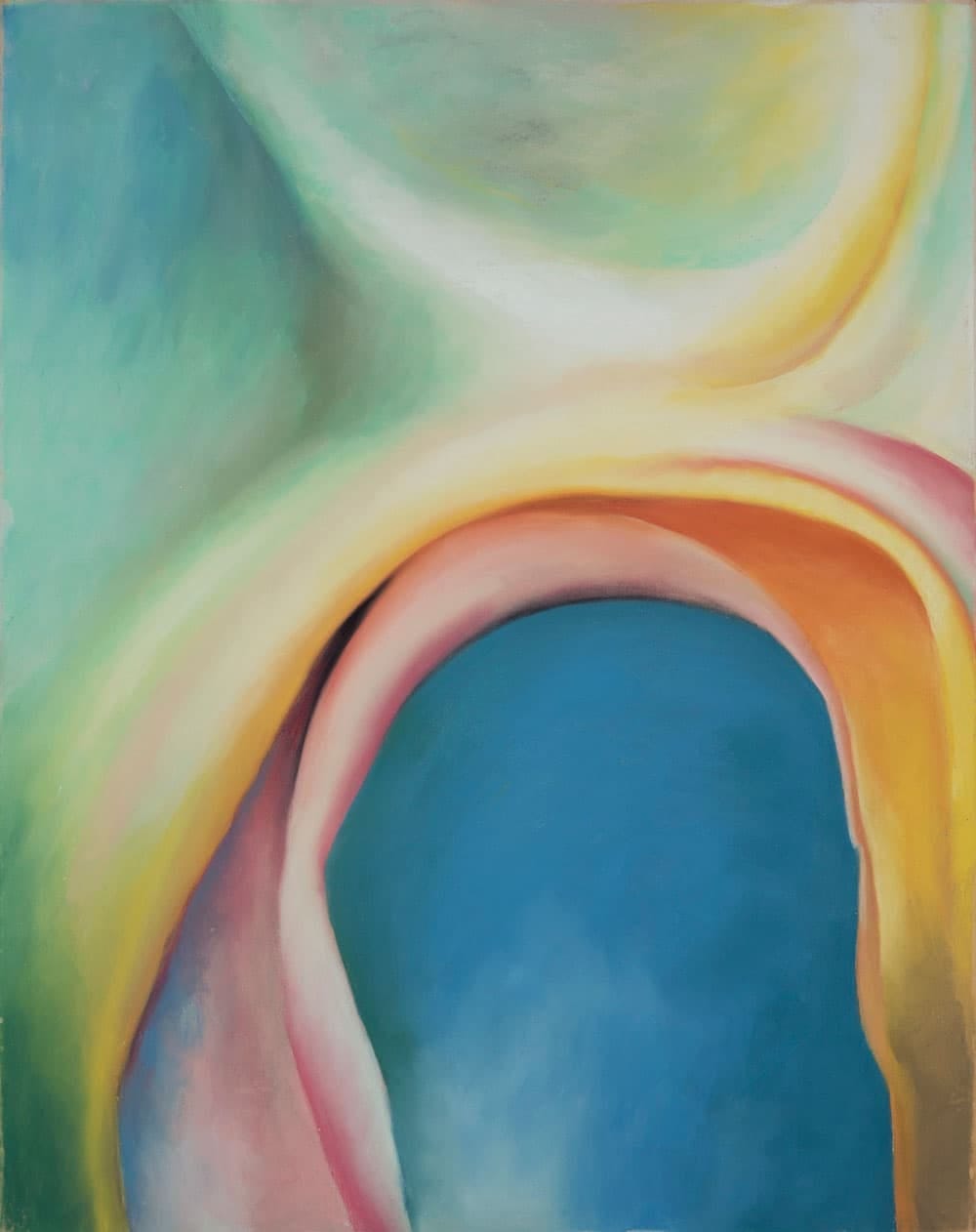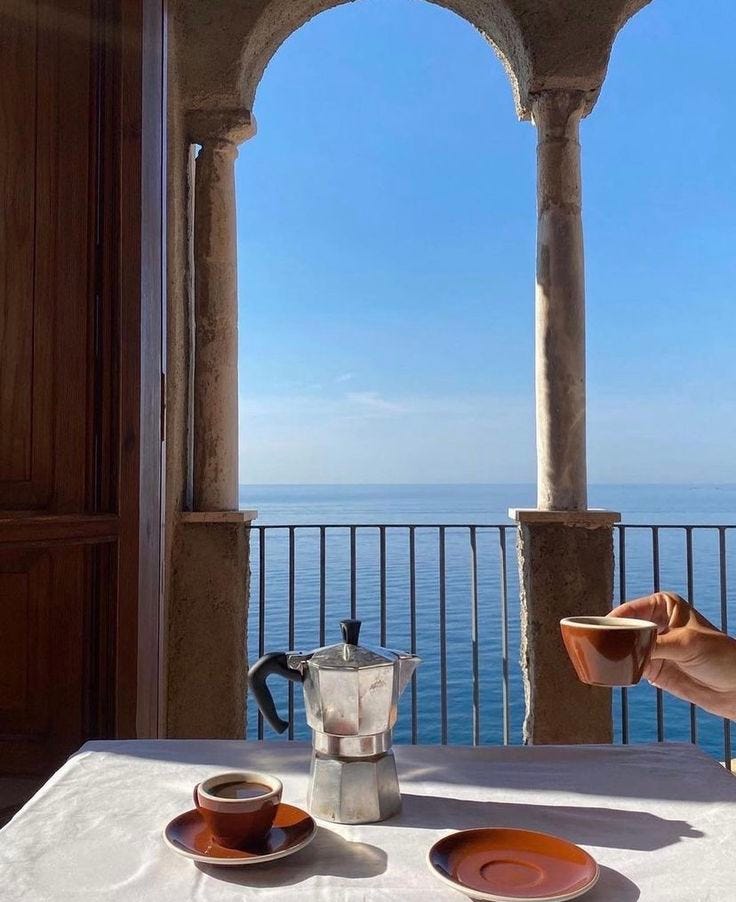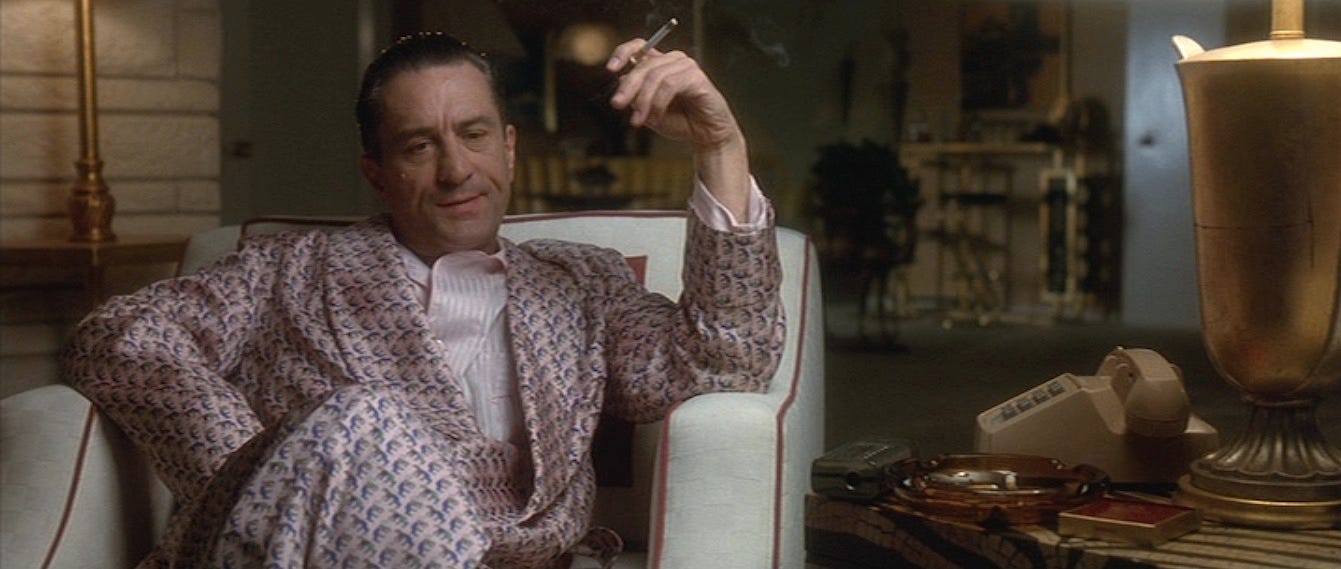In Defense of Slowness
From financial markets to Morandi: a defense of rest, a case for attention, and a reminder that not everything meaningful moves fast.
Afternoon my fine friends. Glad you could join me.
I’ve been under the weather again. As this has been my third bout with this season’s cold, at this point you could probably build a fairly lucrative market strategy off my immune system. Buy when I’m sick, sell when I’m better—it’s been remarkably predictive over the past two months. Though, to be fair, that might just be because I get sick when markets go crazy from tariffs because my job gets harder.
Still, in the midst of what felt like the most chaotic stretch in markets since 2022, I found myself trying to reclaim some semblance of health. And in doing so, I started thinking about something I am spectacularly bad at: slowing down.
That’s what this piece is about— in defense of slowness. Which, yes, might seem seasonally offbeat. Spring is knocking. Social calendars are swelling. I’m entering what promises to be the most wedding-saturated summer of my life. And yet: I’ve been moving slower.
Maybe it’s the cold medicine. Maybe it’s the Morandi. Maybe it’s everything I’ve been reading, watching, and listening to (more on that at the end). But I’ve been thinking a lot about slowness as a kind of rebellion. And maybe—just maybe—it’s one worth leaning into.
Slowness as Rebellion
Normally, I like to match my inner world with the outer one. I read My Brilliant Friend while traveling through Italy, then spent three years grieving the fact that I wasn’t spending my summers in Capri in the '60s. Super healthy, I know.
So, 18 months ago, I read Wintering by Katherine May. It was November 2023, fall (the superior season) was slipping away, and I was trying to emotionally reconcile with winter’s arrival. I expected cozy self-help. Written by an English woman, I wanted personal essays on the rejuvenating effects of walking in the garden with the light misty mornings of winter sunshine. What I got instead was quieter and felt like a jump in icy cold water in December.
The whole book is about the necessity of slowing down. I’ve come to think of it as a manifesto for choosing rest—less as a wellness platitude, more as a cultural rebellion. Because slowness, despite the rhetoric of “self-care,” is still coded as failure. And yet, it’s one of the only reliable foundations for developing good taste and, dare I say, making meaningful work.
We’ll get to that.
May writes for the grieving, the burnt out, the ill, the lost—anyone caught in a season of pause. She reframes retreat not as stagnation, but as preparation. Like nature, we too need winters. These fallow periods are not dead time—they are prelude. Necessary downtime to prepare for what comes next.
And yet, when I stop moving, I panic. I convince myself I’m falling behind. So I push harder. Then I get sick. Then I feel guilty for getting sick. And the cycle repeats.
What Wintering reminds us is that rest isn’t passive. It’s active. A choice. And one that—crucially—doesn’t come with a deliverable. In a culture obsessed with optimization and "biohacking" your way to eternal productivity (Brian Johnson, I’m looking at you), choosing to do nothing is deeply subversive.
Doing Nothing ≠ Emptiness
Let me be clear: doing nothing is not about blank stares and idle minds. It’s not aestheticized apathy. It’s a discipline of attention. A practice of taking in the world and letting it change you. Of being altered by observation.
Julia Cameron puts it best:
“The quality of life is in proportion, always, to the capacity for delight. The capacity for delight is the gift of paying attention.”
When we choose to notice, we cultivate our capacity for delight. We move from consumption to discernment. We begin to develop taste.
Which, frankly, is a cultural superpower. Taste is slow. Taste takes time. It requires you to sit with things—not scroll past them. To return to something. To ask: What is this doing? And then: What is it doing to me?
Taste begins with attention. And attention begins with stillness.
This, to me, is the foundation of cultural fluency. The ability to be surprised. To be moved. To take something seriously before deciding whether you "like" it.
Morandi & the Art of Looking
All this thinking about slowness brought me back to a show I saw in February: Giorgio Morandi: Natura Morta at Zwirner. It featured works from the Magnani-Rocca Foundation and spanned decades of Morandi’s practice.
If you’re unfamiliar, Morandi painted bottles. And boxes. Over and over again. Same shapes. Same palette. A level of visual repetition that, in another context, would be called boring.

But what struck me was how compelling that “boring” became. His still lifes are muted, static—verging on abstraction. By painting the same subjects again and again, across etchings and oils and shifts in time and tone, Morandi created a sustained meditation on attention. On what it means to look.
Donna De Salvo, curator at Dia Art Foundation, described it this way:
“Morandi erased all signs of the lived life from his props. He removed labels from his bottles... His clocks have no faces, his landscapes are without people. The seeming neutrality and constancy of Morandi’s work leaves no room for projection and has allowed artists and others to take from it many things.”
In other words: he made room for meaning by refusing to insist on it.
That’s the quiet radicalism of Morandi. He didn’t reinvent. He refined. He made stillness—not spectacle—his medium. And in doing so, he trusted the work, and the viewer, to meet each other halfway.
Motion vs. Clarity
Here’s the central paradox: clarity often comes from waiting, but we chase it through motion. We believe that to understand something, we have to act on it. Dive in. Zoom out. “Double-click.” Move faster. Think harder. Do more.
And all it really does is create anxiety. The very opposite of clarity.
Eventually, that anxious motion burns us out. And then we’re forced to rest—not by choice, but by necessity. Our sprinting becomes a trap. A choice that felt brave ends up stealing the very autonomy we were trying so hard to earn.
So what’s the antidote?
Presentness. Attention. Stillness. Like Morandi, you slow down. You stop time. You look—not to extract or optimize—but to observe. That’s how you start to see.
Art as a Practice of Slowness
People often ask me how to get into art. Where to begin.
You begin by looking.
Observe what pulls you in. What repels you. Where your mind goes when you’re face to face with a piece. Observe yourself observing. You’ll learn more about your tastes—and your tendencies—than you think.
We all have mental pathways we travel habitually. But you can’t study the path while you’re sprinting down it. You have to pause. Pay attention. That’s where it begins.
And this applies to everyone—from the newly art-curious to the most seasoned collector. Even artists. Especially artists!! MoMA hosted a retrospective on Georgia O’Keeffe curated entirely around the first years of her practice, and the point was she spent just looking. That’s it. Looking.
Let me say it again. One of the greatest artists of the modern era spent her first years as an artist just looking.
This isn’t inefficiency. It’s foundational!
So when people ask, How do I begin?
You begin by doing nothing. But doing it well.
You begin by being willing to be surprised.
You begin by looking.
Slowness Is a Skill (Also, a Strategy)
Here’s a funny twist: even in finance—an industry that fetishizes speed—the people who do the best are often the ones who move the least.* In The Psychology of Money, Morgan Housel notes that the most successful investors are those who simply leave their money in the market. Not the ones constantly shifting, optimizing, tweaking, trading. The ones who choose inaction over reaction.
“Time in the market beats timing the market.”
Arguably the most famous and successful investor of all time, Warren Buffet, spends the vast majority of his time reading, which is the finance equivalent of staring at paintings. He is famously concentrated in his positions, but spends time reading everything (read: “he has developed his taste by spending time with a lot of different paintings (companies), and being selective in the ones he buys.”)
He does not rush decisions, or trade around the margins.
Let me be clear: this is not financial advice. Just a reminder that “busy” doesn’t always mean “better.” Sometimes, doing less is the most effective move you can make.
–
*I’m generalizing, don’t come for me. If you want to fight about optimized return strategies relative to turnover find another substack.
A Season for Looking
The irony, of course, is that I’m staring down the busiest four months of my life. Not an understatement. I think I will be in New York for three weeks max until September.
I’m clearly not opting out of the chaos. I’m not cancelling the travel or the weddings or the moments I’m lucky to be part of. But I am trying to reclaim a few minutes each day. To steal back some quiet. To make my morning coffee a ritual. To leave my phone in the other room while I wake up.
Sounds idyllic. We’ll see if it works.
But maybe, just maybe, the most radical thing I can do this spring is slow down.
Sipped, Snacked and Savoured
A guide to everything I have consumed since the last newsletter. Send me any recommendations for content of all stripes! If you’ve got thoughts on the below, let me know - would be great to hear what y’all are thinking.
This week
Restaurants:
Nowon – a mainstay, the honey butter tater-tots are literally what dreams are made of
Quique Crudo — phenomenal Mexican seafood spot in the West Village, entirely bar seating and even on a Monday night was such a vibe
Ceccioni’s Nomad — a classic place for getting together with friends. You always know what you’re getting. Like an upscale Pecora Bianca.
Movies:
No Country for Old Men (2007) — terrifying, excellent, dramatic, intense. I get it. Call it.
Casino (1995) — Loved it. All of it. I know its long, but damn! Zach likes to say that I am enchanted any time I am reminded that America has history. Which true… but also Sharon Stone!! Her outfits int he 60s!!!! De Niro’s pyjamas!
TV:
The Last of Us, Season 1 — In anticipation of season 2, my fiancé has compelled me to watch the first season of Last of Us. Episodes 1 and 3 broke my heart in so many ways. The cinematography is fun, the nods to video game shots are subtle and interesting. Between this and Fallout I’m excited for this era of content bridging storytelling mediums. Maybe one day they’ll re-attempt Assassin’s Creed.
The Great British Bake-Off — as I mentioned I was ill this week and my comfort show, like many other commonwealth citizens, is GBBO. So I watched the latest season on Netflix, and fell in absolute love with Nelly. Can’t explain it, she cracks me up. Maybe it's the Slavic/Baltic/British humour that really hit but I’m all about her.
Love on the Spectrum, Season 3 — Connor and Georgie are officially my OTP, I have never seen a cuter couple. Bridgerton should take notes, this is a slow burn love story I am invested in.
Bad Influence: The Dark Side of Kidfluencing – I devoured this. I love true-crime and internet crime stuff so this is right down my alley. There are so many things in legislation that have to catch-up with technology and society right now its crazy - The Man with 1,000 Kids is another great example. All these terrible edge cases of society that are brought out of the woodwork because they have made the impossible possible and the worst parts of humanity climb to the surface.
Locales:
Goods for the Study – I needed a new journal, now they have all my money. I spent way too much time wandering around there.
Books:
Shades of Magic by V.E. Schwab – I’m usually juggling four books at once: one fantasy/sci-fi, two non-fiction (one for work—thanks, corporate book club—and one on audio, because silence unnerves me), and something pop-psych adjacent, because I do love a well-branded insight into the human condition.
Having just wrapped up Fourth Wing (a BookTok darling), I was craving something equally escapist but with better prose. So I looped back to V.E. Schwab. I devoured The Invisible Life of Addie LaRue during the pandemic and then wouldn’t shut up about it for three years. I’ve only recently stopped bringing it up in casual conversation—it was starting to feel like a personality trait. Schwab’s writing has this gauzy, just-out-of-reach quality that makes you race forward, chasing the thing you almost understand. So I picked up Shades of Magic, drawn in by the premise: four parallel Londons. Grey London (our own, drab and magicless), Red London (lush, powerful, the novel’s main stage), White London (violent, starved for magic, and a nice reversal of the purity trope), and Black London (collapsed under the weight of its own magic, now the stuff of myth and menace). It felt spiritually aligned with Invisible Cities by Italo Calvino—which, as I wrote in my last newsletter, might as well be my bible.
Music
Nils Frahm – While still deeply in my Waxahatchee kick, I’m also really digging more sound-scape compositions (aware that is obnoxious sounding as it is)
Upcoming
Art-Related:
Amy Sherald exhibition at the Whitney – I need to commune with my lord and saviour — Michelle Obama.
Monstrous Beauty at the Met – chinoiserie reinvestigated through a feminist lens, so I can feel better about the political implications of my love of de Gournay fabric
The Frick Reopening — I cannot wait, highly anticipated by the whole city!
Conversation with Laura Owens — At the Matthew Marks gallery on Friday April 18 with the artist. Really looking forward to this, as the exhibition has been one of my favourites of 2025 thusfar.
Music:
Planetarium Deep Listening Event – I’m going to this, I’m not a big going out girly these days (honestly never was), but have been dying to do a deep listening event. Catch me in a sleeping bag with a pizza. I can’t wait.









Loved this so much! And at the risk of defending the biohacking type, I don't think slowness and optimization are mutually exclusive. The feeling of boredom has been found to have an adaptive function; it's designed to signal us to look for opportunities. If we never slow down--if we're never bored--what signals us to pursue the things that excite us?
So much resonated this week. The time in the market. A spring morning as a pregnant pause. Choosing passivity and letting it work on you. Imy!